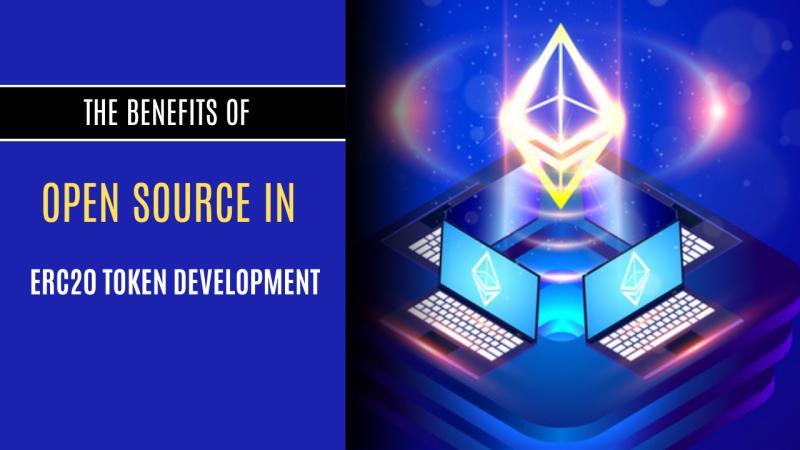The Benefits of Open Source in ERC20 Token Development

The Ethereum blockchain has become the foundation for countless decentralized applications and projects, with ERC20 tokens emerging as the standard for fungible tokens. A key driver of this ecosystem's growth is the open-source nature of Ethereum’s framework. In the world of ERC20 token development, open-source technology plays a pivotal role in innovation, accessibility, and security.
This blog delves into the benefits of open-source technology in ERC20 token development and why it is crucial for developers and businesses alike.
1. Transparency and Trust
Open-source technology promotes transparency, a cornerstone of blockchain technology. The code underlying the ERC20 standard is publicly available, enabling developers, auditors, and users to review it.
Auditable Code: Developers can identify potential vulnerabilities in smart contracts, ensuring the integrity of the token.
Community Validation: The open nature of the code fosters trust among users, as they can verify its security and compliance with standards.
This level of openness builds confidence among token holders and project stakeholders, reducing skepticism and increasing adoption.
2. Cost-Effective Development
For developers and startups, building an ERC20 token from scratch can be expensive and time-consuming. Open-source resources simplify this process significantly:
Pre-Built Templates: Many open-source libraries and templates for ERC20 token development exist, such as OpenZeppelin. These provide ready-to-use smart contract frameworks, reducing development time.
No Licensing Fees: Open-source frameworks eliminate the need for expensive proprietary licenses, allowing projects to allocate resources elsewhere.
By leveraging open-source tools, even small teams can create sophisticated ERC20 tokens without excessive overhead costs.
3. Innovation through Collaboration
One of the most significant benefits of open source is the collaborative environment it fosters. Developers worldwide contribute to improving the ERC20 standard and associated tools.
Global Contributions: A diverse pool of developers continuously enhances open-source projects, fixing bugs and adding features.
Customizability: Developers can modify and adapt the code to suit specific project requirements, enabling unique token functionalities.
This collaborative ecosystem accelerates innovation, ensuring ERC20 tokens evolve to meet new demands in decentralized finance (DeFi) and beyond.
4. Enhanced Security
Security is paramount in blockchain development and open-source code significantly enhances it:
Peer Review: Since open-source codes are public, they are debugged by developers from all over the world, minimizing times attacks can exploit important vulnerabilities.
Battle-Tested Standards: The most popular and well-liked token standard to be implemented across the Ethereum blockchain is the ERC20 token standard and this token standard is already well-tested and utilized across various use cases.
This will enable developers to stand on existing and reliable foundations rather than creating new smart contracts from scratch which greatly reduces the risk of deploying untested smart contracts.
5. Interoperability and Standardization
ERC20 tokens can utilize open source frameworks since they are built with compliance to certain standards that are compatible with most products within the Ethereum ecosystem.
Seamless Integration: Wallets, decentralized exchanges and many other applications that run on the blockchain usually are designed to support ERC20 tokens as they have a well defined and structured form.
Broader Ecosystem Support: Open-source tools increase compatibility with the other blockchain protocols within the entire ecosystem.
This standardization makes development more efficient and also improves the use of ERC20 tokens in different fields.
6. Rapid Problem Resolution
If we consider blockchain as a separate industry and space, it is not without its unique challenges and potential loopholes. Open source ensures:
Quick Updates: Global developers continue to keep track and fix various threats that are being embraced by open-source projects.
Community Support: Open-source frameworks have environments, reports, and customer support, so any problems can be solved promptly.
The increased cautiousness of the market participants collectively decreases the overall ERC20 implementation failure rate and improves the dependability of both tokens and applications that rely on them.
Conclusion
Flexible and open-source development of ERC20 tokens is a brilliant announcement for the blockchain industry. We state that it decentralizes token generation, encourages innovation, makes it secure, and allows for agile solutions. Thus, both businesses and developers get a unique opportunity to save on the means of implementation while ensuring the efficiency of blockchain adoption throughout various industries.
Whether you are a developer venturing into the release of your first token, or a business, considering a solution involving blockchain, the notion of being open source is the initial key to success in the ERC20 token market.
Comments